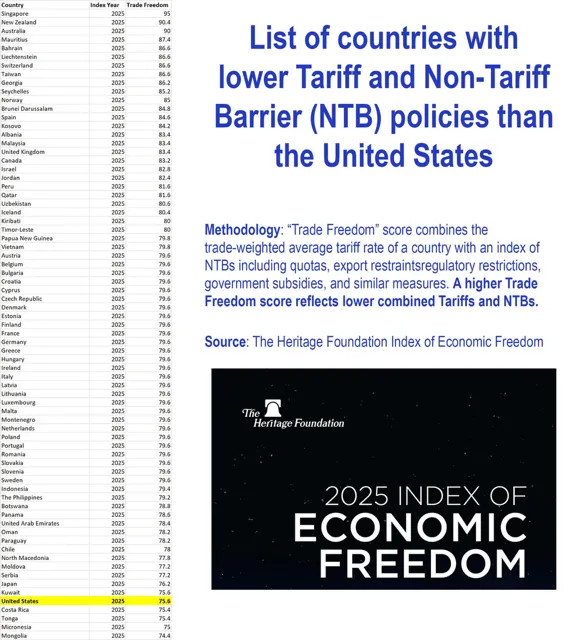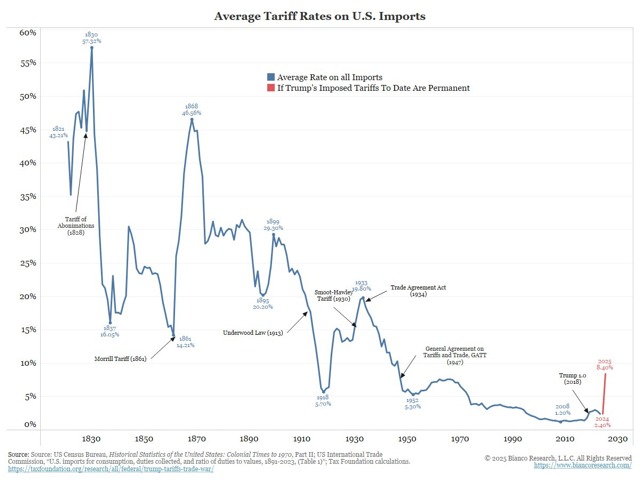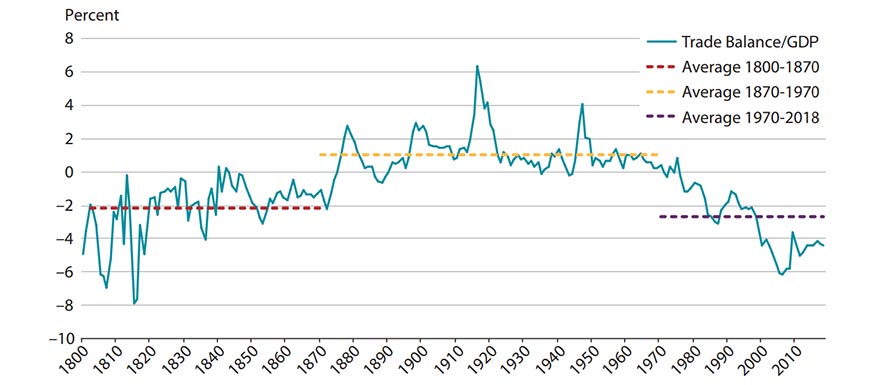By JD Breen
Premium Insights
April 3, 2025
Happy Liberation Day!
Aside from our senses, what are we being freed from?
A properly functioning market? The greatest quality and quantity of goods sold at competitive rates? Producers having to innovate to excel? The ability to buy what we want without giving government a bigger cut?
Whatever deliverance we're promised was postponed by a day, so Americans wouldn't think the jokers in charge were playing them for fools.
But this afternoon, at long last, our president will unshackle us from foreign "unfairness"... by building a bigger blockade around ourselves.
Seriously, not Literally
What are the components of today's Emancipation Proclamation?
Tho' plans could change before lunch, and be revised again until (or after) details are announced, the Trump Administration will ostensibly impose 25% import taxes on cars and parts... atop the same percentage already applied to steel and aluminum... with comparable duties on countries buying oil and gas from Venezuela.
The president has also intimated he'll impose tariffs on certain agricultural imports. Specific products and rates remain unclear (of course), but this could tie to the broader notion of reciprocal tariffs.
As of now, these are anticipated for all trading partners. If taken literally (they shouldn't be, tho' they should be taken seriously), this would entail reducing taxes the U.S. currently imposes on most countries' imports. But it's probably safe to assume that "reciprocal" runs only one direction.

Source: Phil Magness
Sector-specific taxes on imports such as pharmaceuticals, semiconductors, microchips, lumber, and copper have also been bandied. But recent reports suggest they might not be part of today's rollout, with some (or all) delayed indefinitely or excluded entirely.
Other last minute changes may be in the works. Apparently, the Trump team was scrambling into the small hours this morning to concoct new medicine, to make the potion more palatable to Congressmen and executives whose stock portfolios are making them sick.
What ailment is this elixir supposed to cure? Is it more deadly than the assortment of diseases it's bound to cause? We don't know. Nor does anyone else, especially the quacks who are selling this snake oil.
The idea that other countries are "ripping us off" simply isn't true. The 300% Canadian tariffs on US dairy and Japan's 700% imposts on American rice take effect only above export thresholds that are rarely reached.
David Stockman, Ronald Reagan's budget director, explains one example that's indicative of many:
"In 2024 Canada did not collect one single Canadian dollar or US dollar or even plug nickel of tariff revenue from US dairy exporters of the four leading dairy export products-fluid milk, butter, cheese and skim milk powder....
And the reason for that lies in the so-called TRQs (tariff rate quota) that the Donald himself negotiated with the Canadians in the course of attaining his ballyhooed USMCA deal in 2020.
[In 2024] US export volumes did not reach the quota level in any of them. Therefore, no tariff was applied to nearly 71 million pounds of US dairy exports to Canada last year, meaning that the Donald keeps ranting about a problem that he had already fixed himself!"
Economics and Politics
Most economic debates are really political squabbles. We've been conditioned to think of economics and politics are two sides of the same coin. In reality, economics is the gold and politics an alloy... if not outright rust.
"Economists" who advocate tariffs... like those who urge a minimum wage or centrally managed money... are akin to "scientists" who pushed lockdowns to contain a respiratory virus. They almost certainly know better. But they definitely know what's best... for themselves.
As with any government "authority" or corporate "expert", they're extremely knowledgeable in what they are paid to say. They're compensated to promote particular politics under the guise of economics. It's a cloak that gets a lot of wear.
Economics is the study of purposeful human behavior under conditions of scarcity. Politics is forcibly shifting wealth from one pocket to another. As with any taxes, tariffs are terrific for doing that.
Economically, tariffs don't make sense. But politically, they can be potent. As in most political battles, beneficiaries are concentrated and vocal, while victims are usually indifferent and diffuse.
During the most recent campaign, Trump tried to soothe them too. On several occasions, he suggested tariffs could replace the income tax.
That'd be great.
But since the election, it looks like we're getting one and keeping the other. In a shocking development, repealing the income tax is no longer discussed. Probably because the idea was never practical with our gargantuan government.
From the founding to the "progressive" era, tariffs were the main source of government funds. That worked well when the federal budget was only $715M (as it was in 1913). In today's dollars (based on gold), that's about the size of the Department of Energy (among many that shouldn't exist).
Disguising the Disease
US "trade deficits" don't stem from inadequate tariffs. They come from unsound money. Trade surpluses persisted under the gold standard established after the War Between the States. Only after gold's last vestiges vanished in 1971 did these deficits return.
Source: www.stlouisfed.org/on-the-economy/2019/may/historical-u-s-trade-deficits
This makes sense. Sound money is a self-cleaning oven.
Unlike the counterfeit currency, gold isn't infinite. Being grounded, it keeps debtors from digging too big a hole.
Americans can purchase only so many imports without foreign vendors demanding payment. Under a gold standard, Say's Law governs. Consumption requires production.
To acquire the gold needed to buy what they want, Americans must produce goods foreigners need. If they don't, they have nothing to exchange. Imports decline till exports can reciprocate. Trade flows remain in relative balance.
But for half a century, gold hasn't been needed. Instead, American consumers bought foreign products with debt masquerading as money, financed by the "special privilege" of the fiat dollar and the printing press Fed.
Foreigners accepted the dollars, and recycled them into Treasury debt. This kept US interest rates low, facilitating more borrowing that propelled the cycle.
For half a century, government paper has been America's greatest export. In exchange, it received televisions, cars, computers, and phones. It's a wonderful racket.
Until it isn't.
Comparing the chart of average tariff rates below with that of trade deficits above reveals no correlation. As with so many ailments modern society suffers, fake money is the likely cause. Trump is applying a remedy that shields symptoms while disguising the disease.

h/t: Jim Bianco
What Government Does Best
Defenders of increased tariffs argue that foreign manufacturers will foot the bill. To varying degrees and in some situations with certain products, that's undoubtedly true. That's why so many affected foreigners are in a panic.
But the president implicitly acknowledges that much of the burden will fall on Americans. When asked about foreign automakers charging more to U.S. customers, 𝕏 Trump said he "couldn't care less" (he didn't say "it wouldn't"). According to the president, they'd simply switch their purchases to domestic cars.
But what if US manufacturers increase prices in response to foreign competitors raising theirs? In anticipation, the president convened automotive industry CEOs, and 𝕏 threatened them if they dared charge whatever they desire.
Terrific.
The administration threatens not only to raise taxes, but to fix prices! The president not only knows which cars Americans should buy, but how much they should pay for the ones they don't want.
How would Trump have reacted if Joe Biden tried to muscle executives into capping prices? How did he respond when Kamala Harris promised to limit what grocers could charge?
But car buyers aren't the only Americans in the crosshairs.
Would Donald Trump's supporters endorse him offering emergency aid to farmers to compensate for the agricultural havoc his tariffs will cause? We may find out, because that's apparently what the president is considering.
After months touting the "cost-cutting" efforts of DOGE, the administration is contemplating a welfare scheme worthy of every corrupt swamp-rat it pledged to extirpate. First tariffs shield privileged corporations, then bribes entice victims to put their pitchforks away.
This is what government does best: promise a new boondoggle as a band-aid for the wounds inflicted by a previous policy. Not that there's no upside. It just depends who you are.
Tariffs clearly benefit connected insiders who are complicit in these schemes. "Protected" industries obviously profit... at least for a while. But for currying favor from Pharaoh to dodge his duties, connected lawyers, lobbyists, and grifters also land larger mansions and bigger boats.
Uncertainty and Chaos
Many argue that Trump isn't economically illiterate. He's only using tariffs as a cudgel.
Maybe.
But Tracing Trump's Aggressive Tariff Strategy Back to the 1980s | "Trump's Trade War" | FRONTLINE . He seems to value tariffs for their own sake, insisting they not only punish duplicitous trading partners, but benefit put-upon Americans. His plan to bribe farmers argues otherwise.
Trump undoubtedly uses uncertainty and chaos as negotiating tactics. Despite mindless assertions of his enemies, he's not an idiot, and shouldn't be underestimated. While he often seems scattered, he probably has a coherent plan.
A few weeks ago we discussed the "Mar-a-Lago accord", a potential re-ordering of the global monetary system designed to (among other things) weaken the dollar while retaining it as the reserve currency, leverage the US security umbrella to extract concessions from "allies", and to bring manufacturing back to America.
Returning manufacturing to the U.S. would presumably provide more high-paying jobs while shrinking supply chains for such necessities as chips, ships, and pharmaceuticals. Covid lockdowns exposed the risk and fragility of economic links that stretch too tight.
But repatriating production takes time. Executives must raise funds, figure out where to build, construct the plant, and find qualified workers. By then Trump would out of office (or could've changed his mind half a dozen times). Would a new president operate with similar rules?
Who knows?
It's difficult to make capital-intensive plans under such uncertainty. How many executives will promise Trump what he wants, then bide time till he goes away?
We'll see.
As with anything regarding Donald Trump, I'd assume that by tomorrow everything you've just read will be obsolete.
JD
